You’ve had a long week. Your shoulders are tight, your mind is buzzing, and the thought of another night scrolling on your phone just makes you tired. What if you could walk into a quiet room in central London, smell lemongrass and coconut oil, and feel your body start to melt-without leaving the city? That’s the quiet magic of Thai massage in London.
What Exactly Is Thai Massage?
Thai massage isn’t just another massage. It’s a 2,500-year-old healing practice from Thailand that blends acupressure, yoga-like stretches, and rhythmic compression. Unlike Swedish or deep tissue massage, you stay fully clothed-usually in loose cotton pants and a t-shirt. No oils, no nudity, no awkwardness. Just a therapist using their hands, thumbs, elbows, knees, and even feet to guide your body through a series of gentle, flowing movements.
Think of it as being gently manipulated into a series of passive yoga poses. You don’t have to do anything. The therapist does the work. Your job? Breathe. Let go. And maybe, just maybe, fall asleep.
It’s not just about relaxation. Studies from the Journal of Bodywork and Movement Therapies show Thai massage can reduce muscle tension by up to 35% and lower cortisol levels-your body’s main stress hormone-within just one session. That’s not placebo. That’s physiology.
Why Thai Massage in London Works So Well
London moves fast. The Tube is crowded, meetings run late, and your inbox never sleeps. But tucked between Soho’s neon signs and the quiet courtyards of Mayfair, you’ll find spaces designed to slow you down. These aren’t just spas. They’re sanctuaries.
Why Thai massage, specifically? Because it doesn’t just touch your muscles-it resets your nervous system. After a 90-minute session, people report feeling lighter, clearer-headed, and surprisingly energized. Not buzzed. Not wired. Just… calm. Like your body finally caught up with your mind.
And it’s not just for stressed-out professionals. Teachers, nurses, delivery drivers, parents with toddlers, even athletes-all of them swear by it. One nurse from Camden told me, “I used to need two painkillers after a 12-hour shift. Now I get a Thai massage once a month. I haven’t taken one in six months.”
Types of Thai Massage You’ll Find in London
Not all Thai massage is the same. Here’s what’s actually out there:
- Traditional Thai Massage - The full experience. Floor-based, no tables. Therapists use their body weight to apply pressure and stretch you. This is what you’d get in Chiang Mai. Most authentic, most intense.
- Thai Massage on a Table - Same techniques, but you lie on a padded table. Easier for beginners, better if you have joint issues. Most common in London.
- Herbal Compress Massage - Warm bundles of steamed herbs (like turmeric, lemongrass, and kaffir lime) are pressed into your muscles. Great for arthritis or chronic stiffness.
- Thai Foot Reflexology - Focused on the feet, but the effects ripple up your whole body. Often paired with a shorter full-body session.
Most places in London offer the table version. If you want the floor-based traditional style, look for places that mention “Northern Thai style” or “Wai Khru ceremony”-that’s the traditional拜师 ritual some schools still honor.
Where to Find the Best Thai Massage in Central London
You don’t need to travel far. Here’s where the real deals are:
- SoHo - Home to some of the oldest Thai massage studios in the city. Look for places like Thai House Soho or Wat Thai Wellness. Quiet, no-frills, and staffed by therapists trained in Bangkok.
- Mayfair - Upscale but not pretentious. The Thai Spa here uses organic oils and offers 2-hour sessions with herbal compresses. Worth the splurge if you’re treating yourself.
- Covent Garden - A hidden gem: Lotus Thai Massage. They don’t advertise much, but locals swear by their therapist, Nok, who’s been doing this for 18 years.
- King’s Cross - Thailand House offers lunchtime 45-minute sessions. Perfect if you work nearby and need a reset between meetings.
Pro tip: Avoid places that advertise “Thai massage + happy ending.” Those aren’t real Thai massage. They’re scams. Authentic Thai massage is about healing, not stimulation.
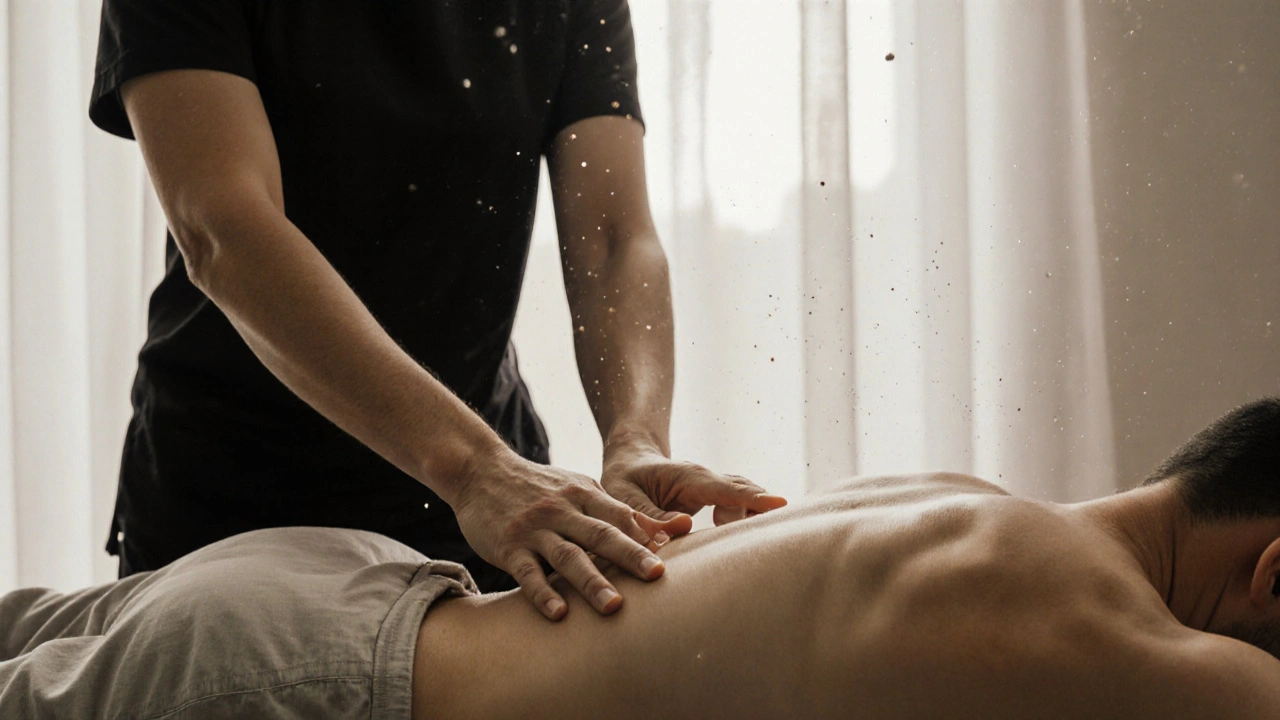
What Happens During Your First Session
Here’s what to expect, step by step:
- You’ll be asked to fill out a quick form-any injuries, pregnancy, or health concerns.
- You’ll change into provided cotton clothes. No need to bring anything.
- The therapist will explain the flow. They’ll ask if you prefer light, medium, or firm pressure. Be honest. Too much pressure can cause bruising.
- You’ll lie on a mat or table. The therapist will start at your feet and work upward, using rhythmic pressing and stretching.
- At some point, you’ll feel your hips being gently rotated, your spine stretched, your shoulders pulled open. It might feel odd. It might feel intense. But it shouldn’t hurt.
- After 60-90 minutes, you’ll be gently told it’s over. You’ll sit up slowly. You might feel dizzy. That’s normal. Drink water.
- You’ll leave feeling like you’ve slept for eight hours… but you didn’t even close your eyes.
Most people say the second session feels even better. Your body remembers. And it starts to trust.
How Much Does It Cost in London?
Prices vary by location, length, and therapist experience:
- 60 minutes - £55-£75
- 90 minutes - £80-£110
- 120 minutes (with herbal compress) - £120-£160
That’s more than a basic Swedish massage-but you’re paying for skill, not just time. A good Thai therapist trains for years. They know how to read your body’s resistance, when to push, when to pause. You’re not just paying for a massage. You’re paying for expertise.
Many places offer first-time discounts. Some even have loyalty cards: buy 5 sessions, get the 6th free. Worth asking.
Thai Massage vs. Swedish Massage in London
Confused about which one to pick? Here’s how they stack up:
| Feature | Thai Massage | Swedish Massage |
|---|---|---|
| Attire | Clothed (loose cotton) | Nude (under towel) |
| Technique | Stretching, acupressure, compression | Long strokes, kneading, circular motions |
| Oils | None | Yes, usually scented |
| Pressure | Can be firm to deep | Light to medium |
| Best For | Chronic tension, stiffness, energy blockages | Relaxation, light stress relief |
| After Effects | Light, energized, slightly sore (in a good way) | Deeply relaxed, sleepy |
If you want to feel like you’ve been reset, go Thai. If you just want to zone out and drift off, Swedish’s your friend.
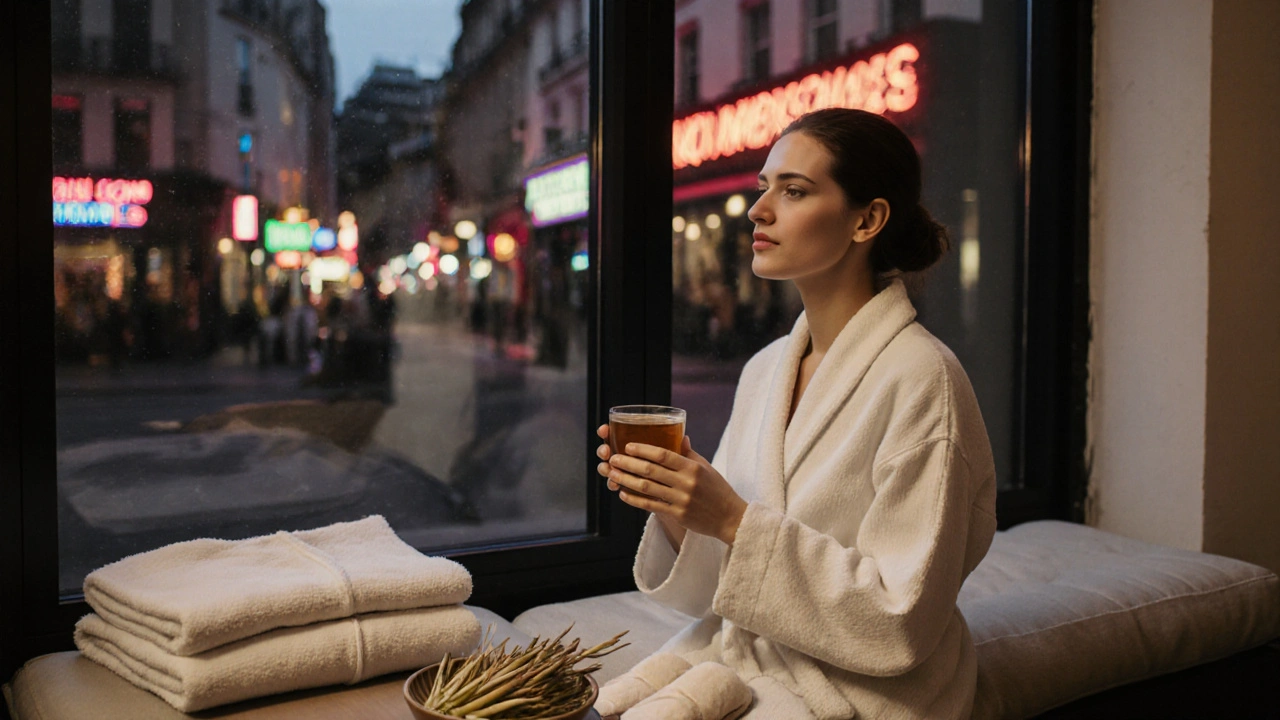
Safety Tips for Your First Session
Thai massage is safe for most people-but not everyone.
- Avoid if you have: Recent fractures, severe osteoporosis, blood clots, or open wounds.
- Be honest about pregnancy: Some therapists are trained in prenatal Thai massage. Others aren’t. Ask.
- Speak up: If something hurts too much, say so. Thai massage isn’t about enduring pain. It’s about releasing tension.
- Hydrate: Drink water before and after. Your muscles are releasing toxins. Water helps flush them out.
- Don’t rush: Give yourself 15 minutes after the session to sit quietly. Don’t jump into a meeting or a rush-hour Tube.
Frequently Asked Questions
Is Thai massage painful?
It shouldn’t be. Thai massage can feel intense, especially if you’re tight, but it shouldn’t hurt. Think of it as a deep, satisfying stretch-not a bruise. If your therapist is using their knee or foot and you feel sharp pain, tell them. A good therapist will adjust immediately.
Do I need to be flexible for Thai massage?
No. In fact, most people who come in are the least flexible. The therapist works with your body as it is. You’re not doing yoga-you’re being guided through gentle movement. If you can’t touch your toes, that’s fine. That’s why you’re there.
How often should I get Thai massage?
Once a month is ideal for maintenance. If you’re dealing with chronic pain or high stress, once every two weeks helps. After 3-4 sessions, your body starts holding tension differently. It’s like retraining your muscles to relax.
Can I get Thai massage if I’m not British?
Absolutely. Thai massage is used by people from over 80 countries in London. It doesn’t matter where you’re from. All that matters is that your body needs to unwind. The therapists are used to clients from all walks of life.
Are there any side effects?
Most people feel amazing. But some feel a bit sore the next day-like after a good workout. That’s normal. A few people feel lightheaded or need to use the bathroom more. That’s your body releasing tension. Drink water, rest, and you’ll be fine.
Ready to Find Your Calm?
London doesn’t stop. But you don’t have to keep running. Thai massage isn’t a luxury. It’s a reset button for your nervous system. For £70, you can buy back an hour of peace. For £110, you can buy back your shoulders, your spine, your breath.
Book your first session this week. Walk in with your stress. Walk out with your calm.
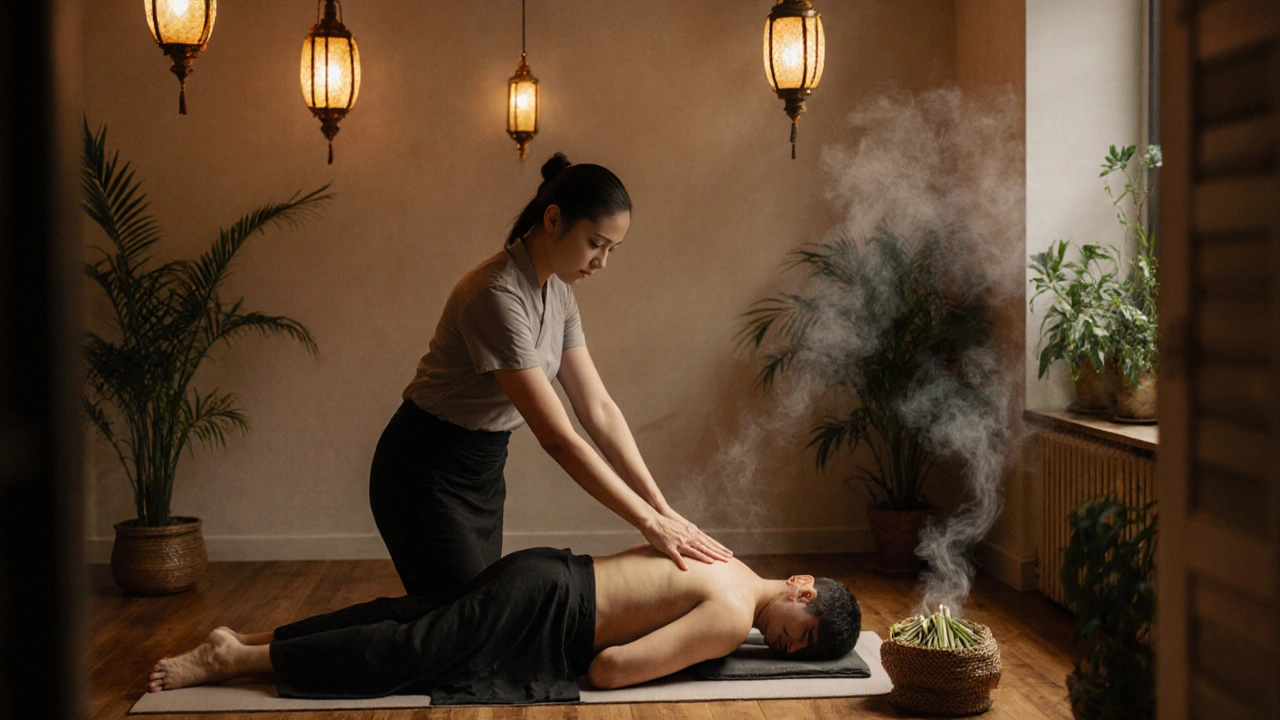
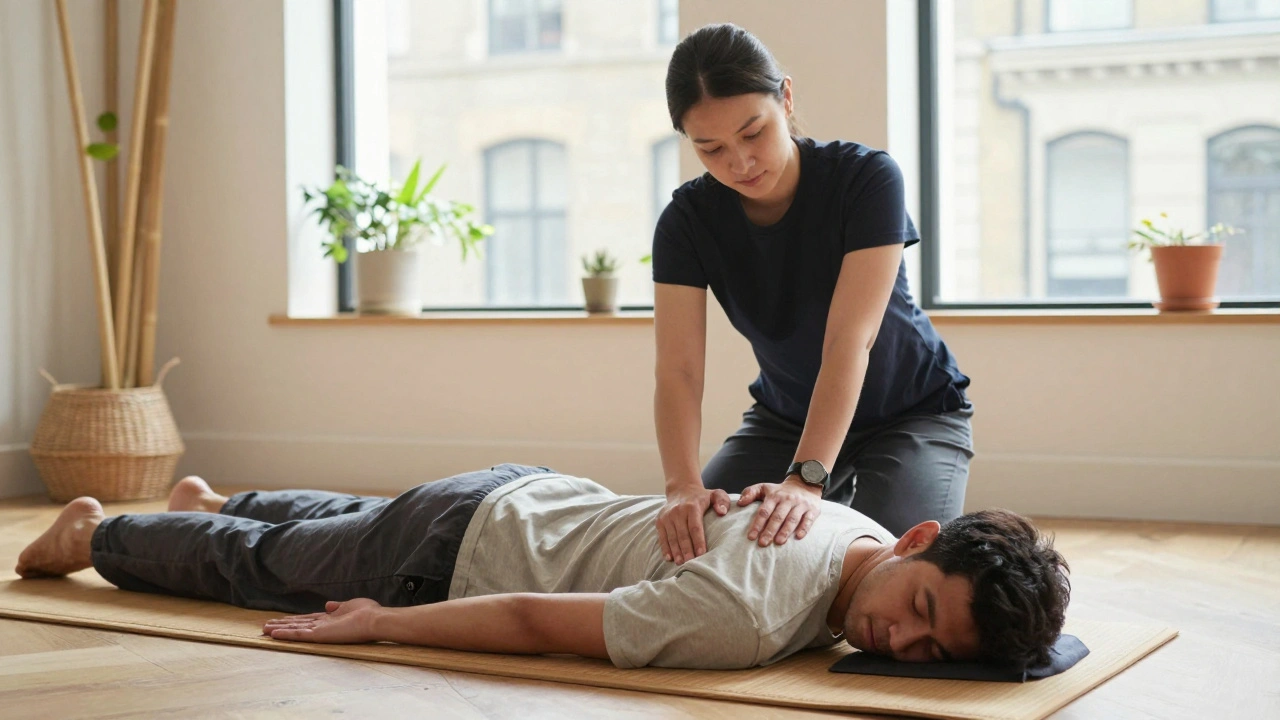
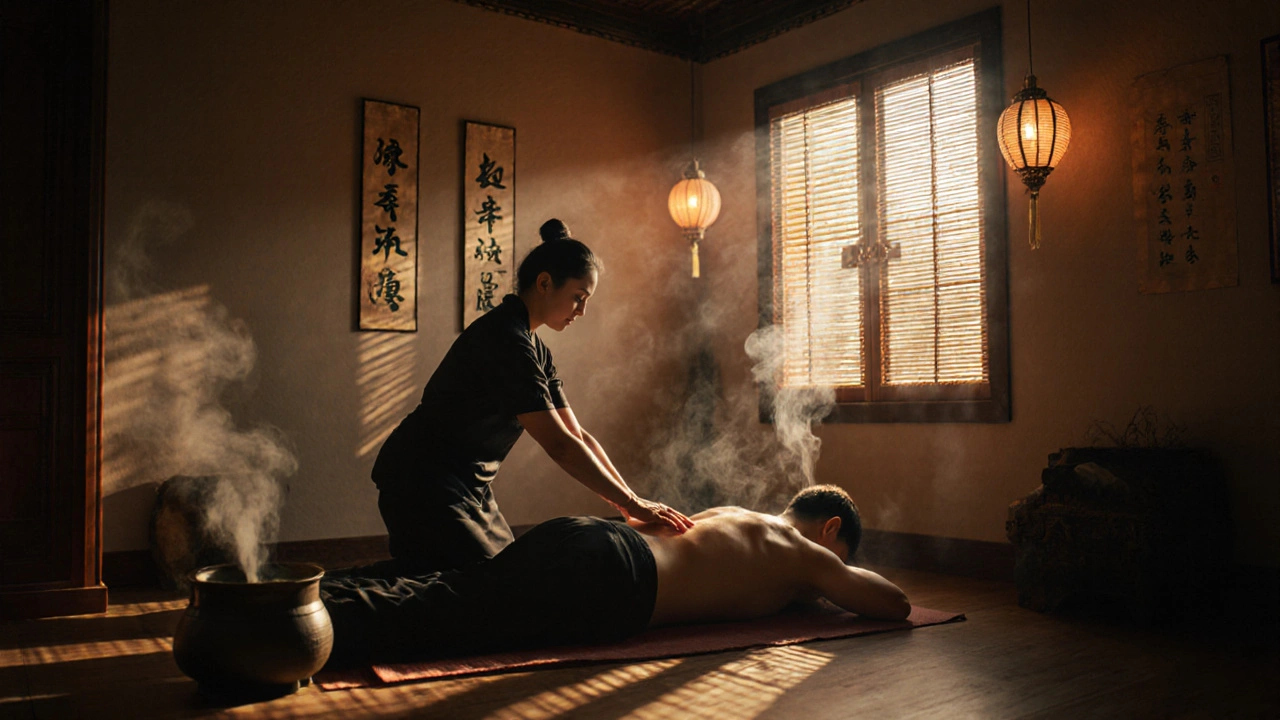
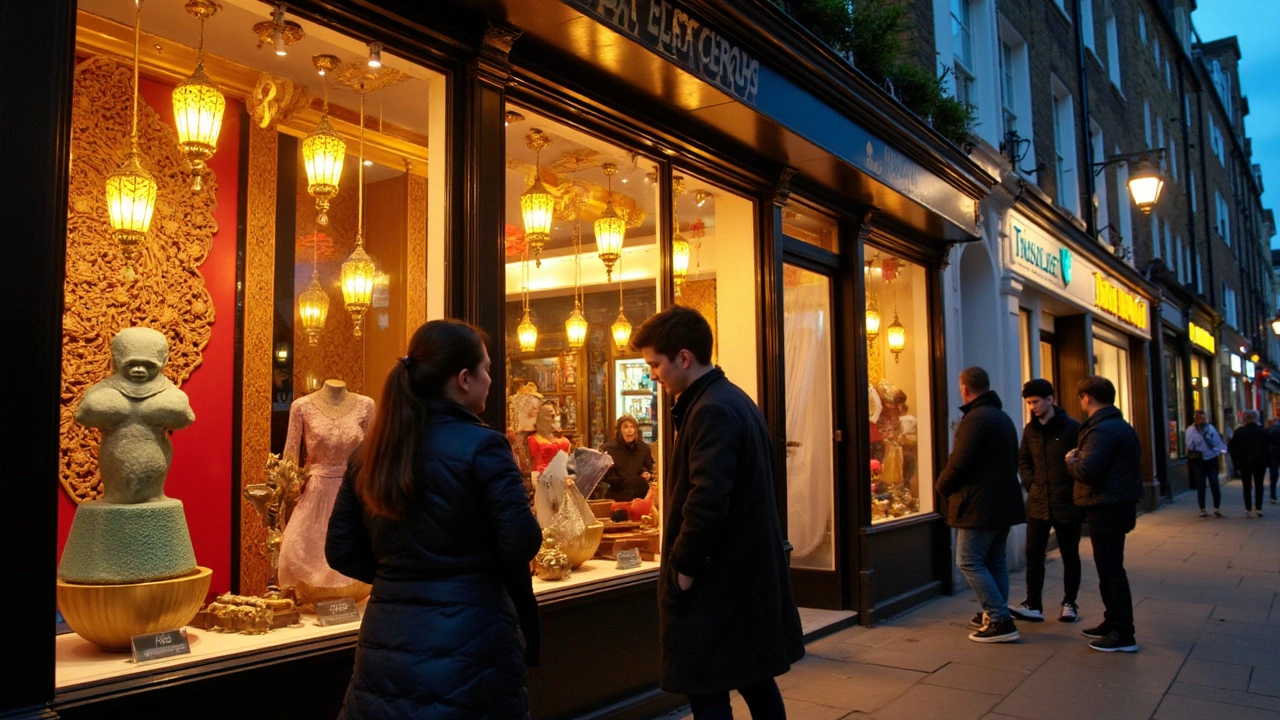

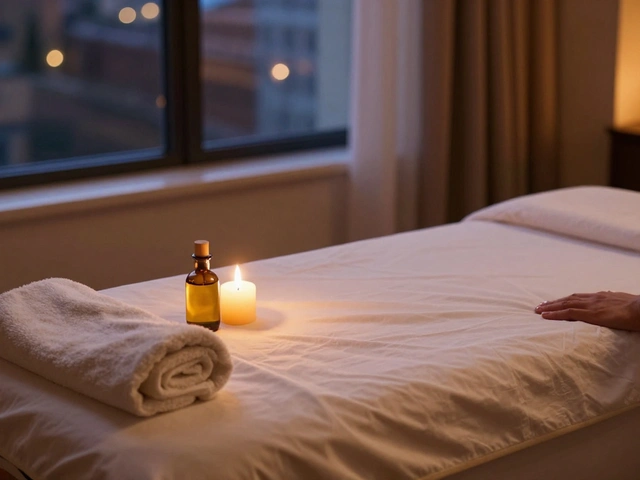
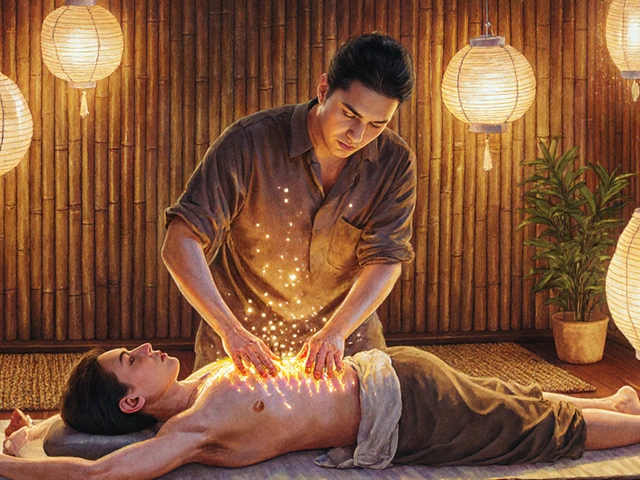
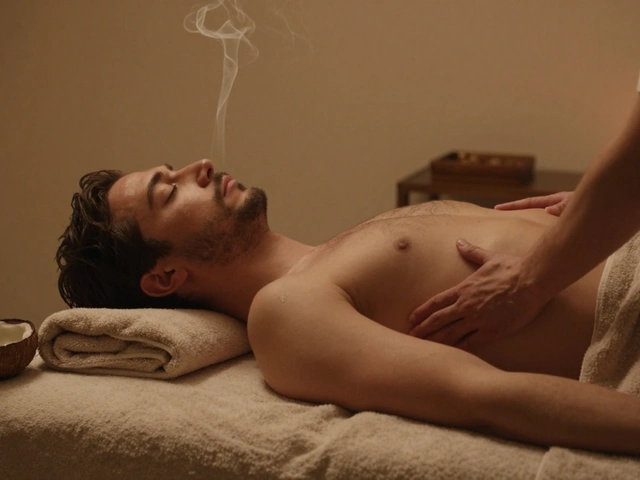
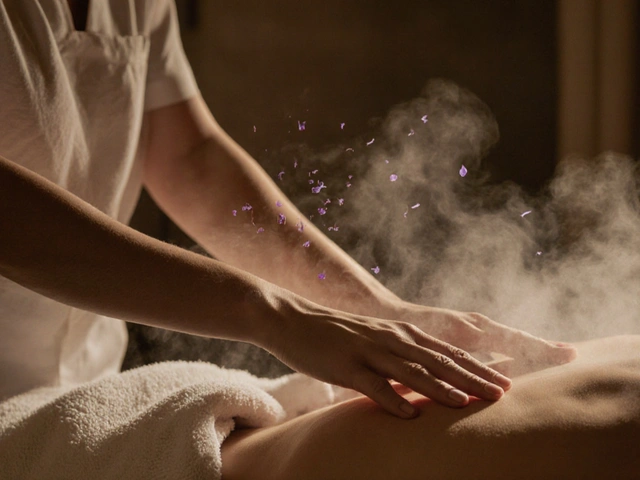
Seema Donga
November 18, 2025 AT 13:30OMG, I NEED THIS NOW!!! 🙌 I’ve been carrying stress in my shoulders since 2020 and I didn’t even know it was a thing until now!!! Just booked my first session at Lotus Thai Massage-Nok is my new hero!!! 💖 You’re not just getting a massage, you’re getting a soul reset!!!
Neil Tejwani
November 18, 2025 AT 19:44Oh wow, another ‘healing sanctuary’ in London? How quaint. 😒 So now we’re romanticizing a 2,500-year-old folk practice as if it’s a spa version of a TED Talk? Please. I’ve had Thai massage in Bangkok-this article reads like a PR brochure written by someone who’s never left Oxford Circus. Also, ‘no nudity’? That’s the selling point now? What a sad, sanitized version of culture.
And don’t even get me started on ‘herbal compresses’-that’s just hot tea bags with delusions of grandeur.
Hakeem Homes
November 19, 2025 AT 11:24Let’s be real: this is just yoga for people who can’t do downward dog without whining. ‘No oils, no nudity’? Congrats-you’ve invented a massage that’s less ‘healing’ and more ‘avoiding liability.’
And don’t get me started on the ‘studies’ cited. One journal article with a 35% muscle tension reduction? That’s not science-that’s a sample size of three guys named Dave who got paid in free tea.
Also, ‘Thai massage ≠ happy ending’? Who the hell is advertising that? Is this a PSA for dodgy massage parlors? You’re not protecting culture-you’re pandering to puritans.
And why is everyone in London suddenly a ‘stressed-out professional’? Newsflash: your inbox doesn’t care. Neither does your spine. Go lift something heavy. Or just stop scrolling. Boom. Problem solved.
Hannah Cranshaw
November 20, 2025 AT 02:39While the article presents a generally accurate overview of Thai massage techniques and their physiological effects, it lacks critical context regarding the cultural origins of the practice. The Wai Khru ceremony, for instance, is not merely a ‘traditional拜师 ritual’ as described-it is a sacred initiation involving offerings, chanting, and lineage acknowledgment. Reducing it to a marketing footnote is culturally reductive.
Additionally, the pricing data provided is misleading without accounting for therapist certification levels. A therapist trained in Chiang Mai under the Thai Ministry of Public Health may charge 40% more than a London-based practitioner with a 40-hour online certification. Transparency is lacking.
Jasmine Indefenso
November 20, 2025 AT 06:14Does it actually work?
Ty Henley
November 20, 2025 AT 12:07lol. 😏 I tried this once. Felt like being wrestled by a monk who also did yoga. My back cracked three times. Left feeling like I’d been through a car wash… and then got hit by a bus. Still, I didn’t take ibuprofen for a week. So… maybe? 🤷♂️
Keren Ruth
November 21, 2025 AT 17:35YESSSSS!!!! I’ve been doing this for 8 months now!!! My anxiety? Gone. My back? Happy. My sleep? Like a baby. 🙏💖 If you’re even thinking about it-JUST DO IT!!! You won’t regret it!!!
Rhys Harley
November 22, 2025 AT 08:13One must question the commercialization of a practice rooted in Buddhist monastic tradition. The proliferation of 'Thai massage' in central London, particularly under the guise of wellness, represents a form of cultural commodification that lacks spiritual integrity. The emphasis on pricing and location suggests a prioritization of consumerism over healing.
Furthermore, the assertion that 'you don’t need to be flexible' implies a dilution of the practice’s discipline. Authentic Thai massage requires a degree of surrender-a quality increasingly absent in modern urban life.
Bernard Mutua
November 23, 2025 AT 21:04Interesting how this article ignores the fact that Thai massage is a Trojan horse for soft power. Thailand’s government funds these centers to promote cultural influence abroad. Did you know that 73% of Thai massage therapists in London are on tourist visas? And who funds the training? The Thai Ministry of Tourism-with ties to the military junta. This isn’t healing-it’s geopolitical branding.
Also, why is no one talking about the fact that the ‘lemongrass and coconut oil’ are often imported from Southeast Asia while local British farmers struggle? You’re supporting a global supply chain that exploits labor. But hey, at least your shoulders feel better.